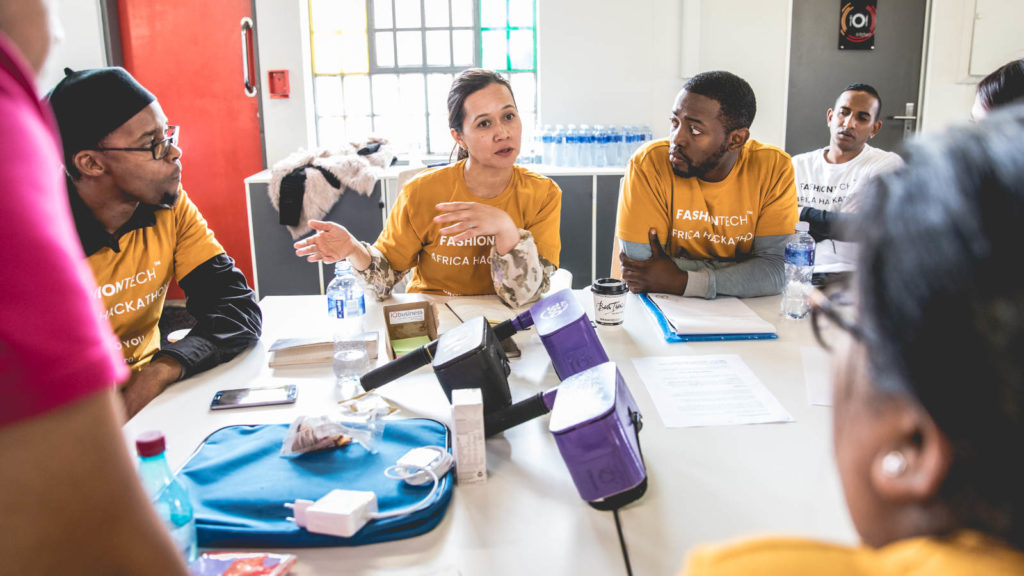AI chat is no longer just about faster answers or conversational tone. Search.com, a division of Public Good, has launched a generative AI search…
Will fashiontech make Africa more competitive in the global fashion sector?

What are you wearing today? Odds are your clothes were not designed or made in Africa.
According to the African Development Bank Group, sub-Saharan Africa represents just under one percent of global fashion exports. Could the fusion of tech and fashion –fashiontech — make Africa more competitive in the fashion industry?
Mustapha Zaouini, who runs a Johannesburg-based tech startup studio, says the market for fashiontech solutions in Africa is as yet unquantified, but adds that it is growing.
He points to the McKinsey Global Fashion Index which forecasts that industry sales are expected to nearly triple between 2016 and 2018, from 1.5% to between 3.5% to 4.5%.
Last Monday (16 April) business consultancy NonZero hosted the FashionTech Africa Hackathon in collaboration with Zaouini’s studio Fliptin, and the Tshimologong Digital Precinct as part of the graduation event of the Standard Bank fashion accelerator Threads.
Investors are already investing in exploring fashiontech and deploying pilots says Fliptin CEO Mustapha Zaouini
The 24-hour long hackathon culminated in three teams presenting live demos on 18 April at the FashionTech Africa Conference in Johannesburg.
In an email to Ventureburn, Zaouini said that the aim of the hackathon was to come up innovative solutions to how technology can enable convergence with the fashion industry both offline and online.
“It was an opportunity to create technology-driven solutions to advance the African fashion retail industry and create products that can enhance their ability to compete in the markets they operate in, as well as those they aspire to expand to,” he said.
The hackathon also served as the final challenge for designers in Standard Bank’s 12-week long fashion accelerator. The accelerator aims to equip fashion entrepreneurs with skills in logistics, ecommerce, franchising, accounting and marketing that will enable them to develop profitable and sustainable businesses.
The accelerator is held across locations in Cape Town, Durban, Johannesburg and Port Elizabeth. In its most recent cohort the accelerator assisted 12 fashion entrepreneurs.
Zaouini said the hackathon also aimed to immerse these entrepreneurs in the digital world so they could explore new ways that technology can grow their business and allow them to respond to changing customer tastes and shopping preferences.
Hackathon teams
The participating teams were:
- Red Apple 3D CEO Mohammed Hassen led the 3D team that created the Living Sole app that allows buyers to scan their foot, and then on uses the 3D data to create customised shoes.
- Kimard Studio CEO Arnaud Kim led an augmented reality (AR) team that created a virtual changing room and virtual stylist which can actively learn more about the buyer’s tastes. The app makes recommendations and assists buyers to mix and match outfits based on their past preferences.
- Alt 360 CEO Brian Bikitsha led the virtual reality (VR) team that developed an app which allows buyers to buy personal items like socks and underwear without worrying about hygiene or leaving their homes.
An Internet of Things (IoT) team which was meant to be led by Smart City CEO Phathwa Senene dropped out of the event.
The AR team was crowned the winner of the hackathon by a panel that included investors, marketing experts, and startup analysts. The VR and 3D team tied in second place.
‘Investors exploring fashiontech’
What areas within fashiontech should entrepreneurs then focus on? Zaouini advises startups to not focus on any one area as that could prove detrimental to entrepreneurs. “From the product side, things like 3D have massive potential and from the retailer’s side, things like IoT mixed with AI open us new opportunities,” he said.
He added that ecommerce is a growing area, but even with that, there are many models which are being enabled by AI, VR and AR. These models, he said, are evolving every day.
“Some technologies such as the blockchain are poised to overhaul entire systems and have applications which vary from fair trade to anti-counterfeit efforts,” he said.
With timing of adoption of fashiontech differing across markets, one wonders whether investors are ready to back fashiontech ventures and innovations. Zaouini thinks they are.
“Investors are already investing in exploring these technologies and deploying pilots from Spree locally to Nike globally.
“The questions raised by the jury (at the hackathon) were ranging from user journey and convenience for the VR headsets, to technology readiness and cost for the 3d printing of soft soles, to consumer behaviour tested in other AR pilots,” he explained.
Featured image: Participants at the FashionTech Africa Hackathon (supplied)


